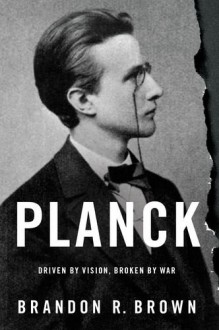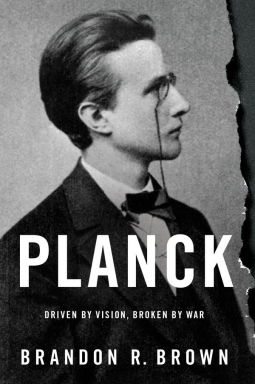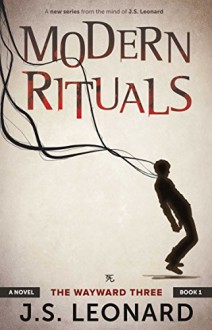
I got a copy of this from Net Galley.
In summarizing what most of us know about Planck, Brown described my knowledge pretty accurately. I'm a physicist, so I know about his most famous scientific work. And that he had a moustache. That's about it. Most people don't even know that. But he led a fascinating life, both scientifically and historically. His legacy is problematic because he chose to stay in Germany through the Third Reich, famously pledging his allegiance to it in 1933 when so many scientists, including Einstein, were fleeing. But he also never really accepted Nazi ideas, so it's a complicated story of trying to change the system from the inside, or maybe just clinging to the idea that science is completely separate from politics, despite all the evidence to the contrary, or maybe just plain cowardice. Or some combination of the above. But mainly it's a story of a man who saw himself as German and could imagine leaving, believing that this craziness must pass, if he could only last until then.
Einstein credited Planck with being the originator of quantum mechanics, and although not every agrees with that singular characterization, certainly he was crucial to the development of that branch of physics. Planck was already established and serving as a journal editor when Einstein was writing his early papers, and Planck could credibly be said to have discovered Einstein (though surely this was inevitable). Planck was also famous for championing the career of the young Lise Meitner, who was an early nuclear physics theorist, narrowly missing out on the Nobel Prize (but she does have an element named after her). When quantum mechanics was the hot new thing, enthusiastically developed by a group of physicists in their 20s at a breakneck speed, Planck was a well-known voice calling out for caution and conservatism, the old guard questioning the difficult ideas of the new. He died in 1947 at the advanced age of 89. This is remarkable, especially considering where and when he lived: he survived WWI and the starvation associated with it, the terrible economic times of the 1920s, and the rise of the Third Reich and subsequent WWII with all of its bombings. He buried a wife and four adult children: two daughters who died after childbirth from poor nutrition and health associated with hard times, one son killed on the battlefields of WWI, and one son who was executed by Hitler's regime for his supporting role in the 1944 attempt on Hitler's life. His remaining child, shared with his second wife, got stuck behind the Iron Curtain in Berlin after the war.
The book is full of delightful stories. It is not what I would call a historical biography, though. Usually historical biographies are concerned with the timeline of the subject's life, and Brown seems to have much more concern for the relationships and ideas in Planck's life than a straight development of events in any sense of the word. The chapters begin during WWII, near the end of Planck's life, beginning with the trial of his son and ending not long after the end of the war. A very short timeline indeed. The rest of his story is told as asides, almost. Not flashbacks per se, but background. In the first few chapters, a complete outline of Planck's life appears, although hung with few details and little explanation. Then, as the chapters proceed, Brown goes back and fills in pieces of this outline, here and there, as it suits him thematically. We end up with a pretty good picture of Planck's life, but the story-telling can be a bit jarring. It is as if a very knowledge-able person sat down to tell the story of Planck and WWII, but kept getting distracted. Also, the reader should have some sort of historical scaffolding to fit these details into: some recognition of early physicists' names, the names of the principal players in the Third Reich and principle events of the wars, and some German history. The book is not long on context.
Brown, then, does not tell stories like a historian, in context and in a straight line. But he does tell stories like a scientist, with a focus on ideas and relationships. And he's quite good at explaining the necessary basic science, including relativity and quantum mechanics.
On the whole, I really enjoyed this book. But I would principally recommend it to readers who already have a working understanding of the history of this era, and wish to fit Planck's story into that era. I'm not sure that my undergraduate students would be ready for this book. Not because the science is advanced, but because the history is not fully fleshed out.


 Log in with Facebook
Log in with Facebook 















